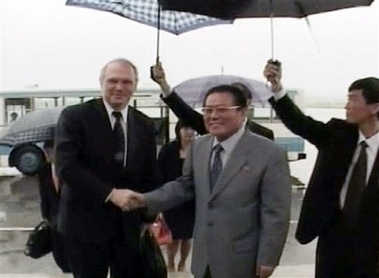Americas
US envoy: North wants denuclearizatioN
(AP)
Updated: 2007-06-22 19:56
 |
Large Medium Small |
SEOUL, South Korea - US envoy Christopher Hill said Friday that North Korea is prepared to promptly carry out a pledge to shut down its main nuclear reactor, but warned that the country's complete denuclearization will not be easy.
 In this image from television, Assistant US Secretary of State Christopher Hill , left, is greeted by an unidentified North Korean official, center, as he arrives at an airport in the North Korean capital of Pyongyang on Thursday June 21, 2007. The high-ranking US envoy made a rare trip to North Korea on Thursday in a surprise bid to accelerate the international efforts to press the government to abandon its nuclear weapons program. [AP] |
Hill, spoke to reporters following his return earlier in the day from a brief, surprise trip to North Korea, where he held talks with the country's chief nuclear negotiator and foreign minister.
"I come away from this two-day set of meetings buoyed by a sense that we are going to be able to achieve our full objectives, that is complete denuclearization," Hill said.
He also said, however, that he is "also burdened by the realization of the fact that we're going to have to spend a great deal of time, a great deal of effort, a lot of work in achieving these."
Hill is the chief US envoy to the six-party framework of nations that is working toward North Korea's nuclear disarmament. Besides North Korea and the US, the other members are China, Japan, Russia and South Korea.
Despite promises by North Korea, the six-party process, which began in August 2003, has failed to achieve any concrete action by the country toward denuclearization.
Tensions surrounding the North's nuclear programs heightened in October last year when the country carried out its first nuclear test explosion, sparking outrage worldwide.
In February, North Korea promised the other five countries that it would shut down its main nuclear fuel processing facility at Yongbyon by mid-April.
That was delayed, however, due to a dispute over $25 million in allegedly illicit North Korean funds frozen in a bank in the Chinese territory of Macau.
"The DPRK indicated that they are prepared promptly to shut down the Yongbyon facility as called for in the February agreement," Hill said, referring to the North by the abbreviation of its official name.
The rare visit to Pyongyang by a high-ranking US official came amid hopes North Korea was on the verge of taking concrete steps to carry out its commitment to shut down its bomb-making reactor following the resolution of the financial dispute.
On Saturday, the North's state media said it had invited inspectors from the International Atomic Energy Agency to visit the country next week. North Korea expelled the U.N. nuclear watchdog in 2002.
Hill said earlier this week that the financial problem had been solved and that North Korea had received the money. However, a Russian official said Friday that technical difficulties had caused a delay, though the transfer should still go through.
"The money transfer is to be conducted today," Deputy Foreign Minister Alexander Losyukov said, according to the ITAR-Tass news agency. Officials have said the money was to be sent to a North Korean account at a Russian bank.
Hill also said Pyongyang is ready to completely disable the reactor, also in line with the February agreement, "although we must work out the details."
He said that both North Korea and the US "reaffirmed our commitment to the February agreement and to the complete fulfillment of that February agreement."
Hill also said that he and the North Korean officials expressed their support for holding an early meeting of chief delegates to the six-way talks, as well as a meeting of foreign ministers from those countries.
The US envoy, who carried the rank of assistant secretary of state, said that he was invited to visit North Korea by Kim Kye Gwan, his negotiating counterpart, and made no effort to meet North Korean leader Kim Jong Il.
Hill went to Seoul earlier Friday for consultations with South Korean officials. He appeared at the press conference along with his South Korean counterpart in the six-party talks, Chun Yung-woo.
"The talks were very detailed, very substantive and I believe they were also very useful and positive," Hill said of his approximately 24 hours in the North.
Hill said he planned to travel to Japan to brief officials there and would also talk with his Russian and Chinese partners.
The visit by Hill, coming before North Korea makes good on its promises, appeared to demonstrate how much the US wants to achieve a breakthrough in efforts to dismantle Pyongyang's atomic weapons program.
The administration of President Bush has in the past preferred to meet the North with regional powers like China and Japan at the talks.
But the US has been moving away from that limitation, holding meetings on the sidelines of summits and sending White House adviser Victor Cha to Pyongyang earlier this year. Hill's trip is the clearest indication yet of a more direct approach.
The US and North Korea have been at odds since the 1950-53 Korean War and do not have formal diplomatic relations.
| 分享按钮 |